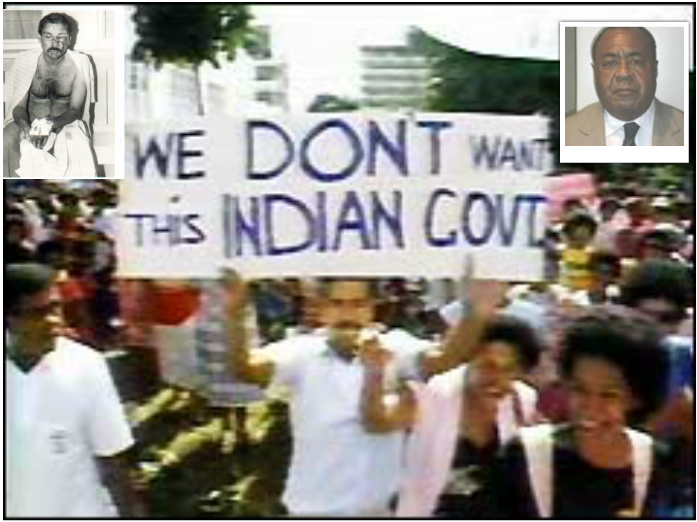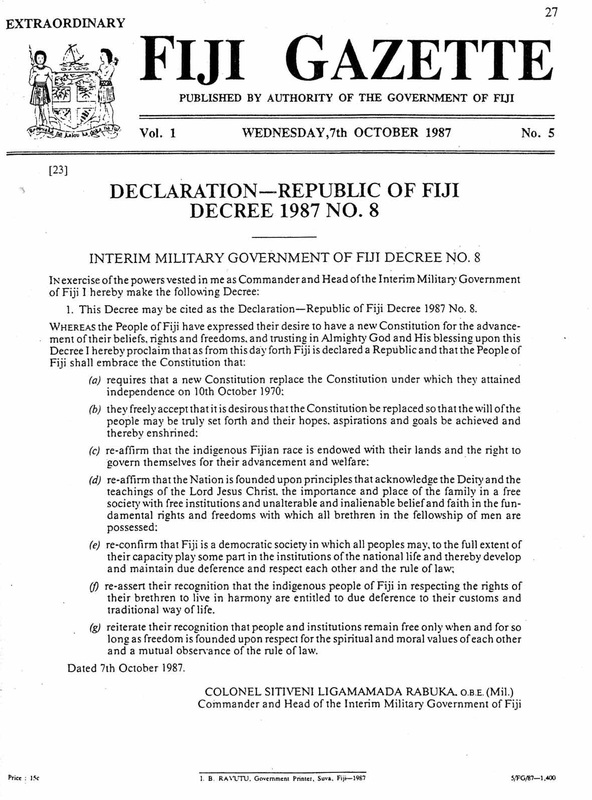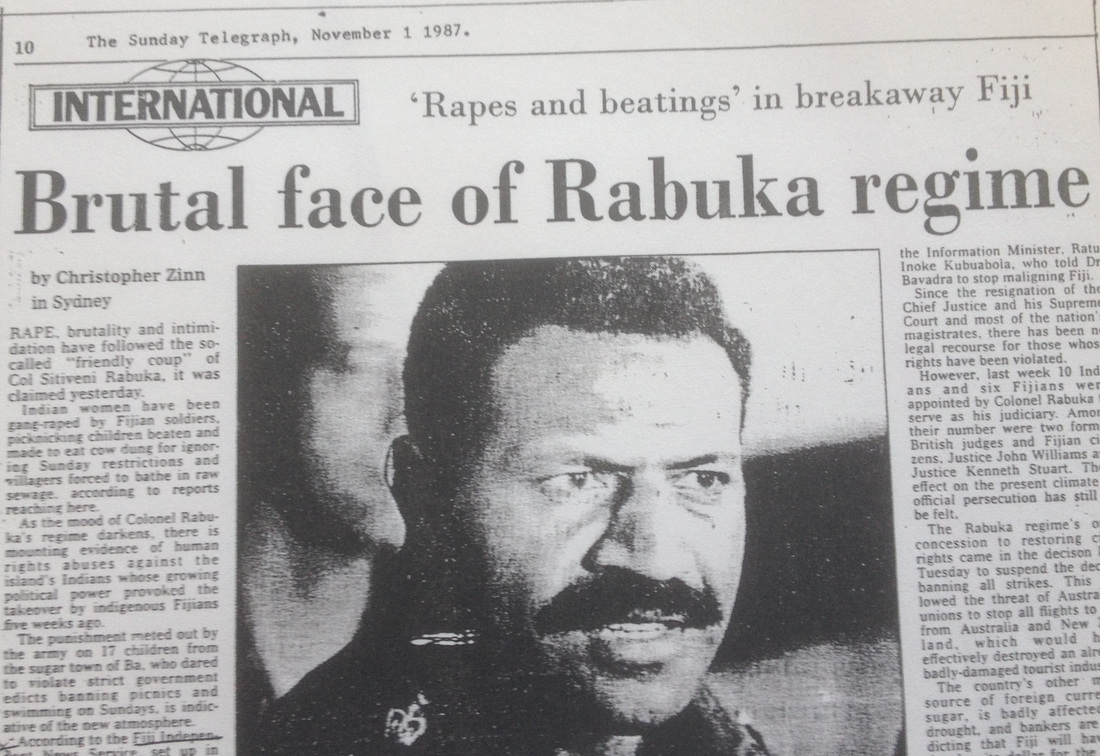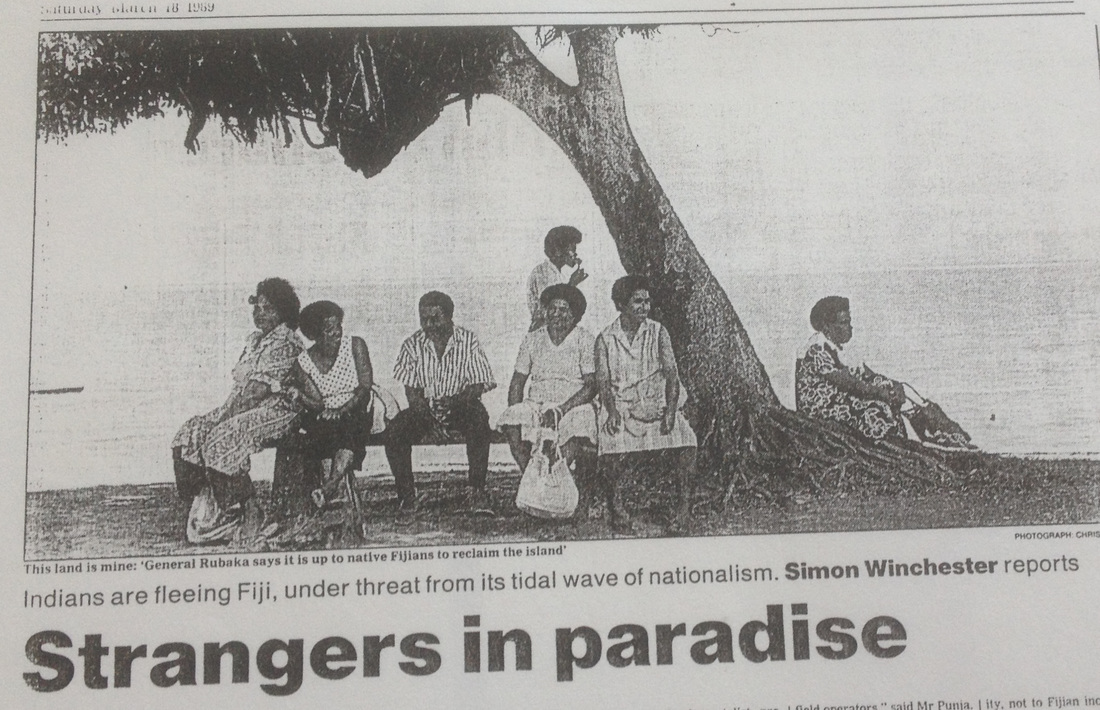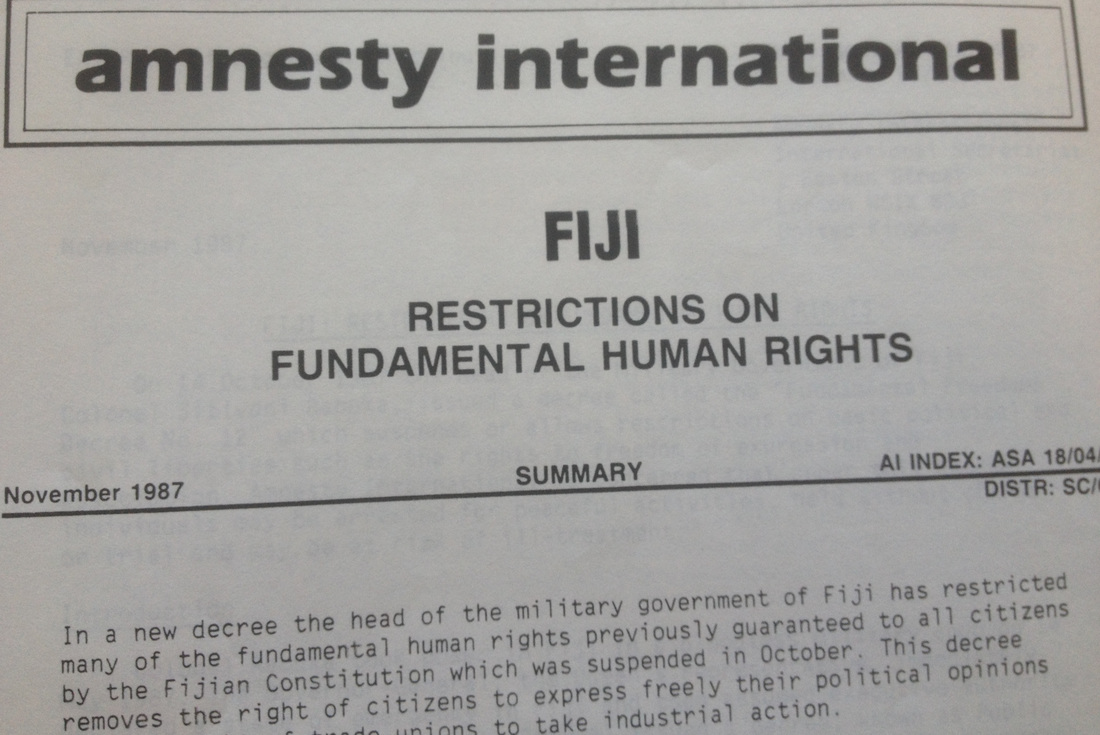"I want the Indians to stay here. It will be a big challenge for us to convert them to Christianity...we either go that way, or they convert us and we all become heathens." - Sitiveni Rabuka, 1987
History Men: Fiji Sun's overseas lawyer Steven Stanton and the Declaration of the Republic of Fiji in 1987:
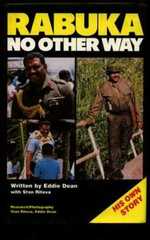
p79: Australian lawyer, Mr Steve Stanton, who was appearing in a case on the morning of the coup, said he saw a message brought in to Mr Justice Rooney a few minutes after 10am, and as he read it, everyone in the court room heard the judge breathe the word: "Oh, ----" The hearing broke up in some disorder, and Stanton went outside to find: "Balaclavas, gas masks, troops, running all around. You could see Rabuka in his sulu and coat talking to the politicians, and then the escorts took them away." Stanton says he had a bowl of grog with Rabuka (whom he hadn't met before) in the Opposition rooms. "He indicated that it had been executed with precision, and he was very happy. He had a lot of things to do, and he intended to go about his business and stay calm," Stanton recalls.
Stanton, later that morning, was asked to go and see Mr Justice Kishore Govind, who wanted to discuss with him Fiji's Constitution - which Rabuka had claimed to have suspended, or abrogated. Stanton met Justice Govind, Sheehan and Rooney. "The judges were very apprehensive about this seemingly outrageous attack...on their judicial independence and impartiality...I spoke to Justices Sheehan and Rooney, who were a bit dismayed about what was going on, and they were seemingly apprehensive, but putting on a brave face". Justice Govind later indicated to Stanton, at a mutual friend's house, that he "was utterly abhorrent of the Colonel's usurpation of power, the affront to Her Majesty and her judges, apart from the legislature and the executive," according to the Australian lawyer. The judges advised the Governor-General that, in their view, Rabuka's actions were unconstitutional and his military regime was illegal. It was their views which helped encourage Ratu Sir Penaia Ganilau to stand firm over the coming days and weeks, insisting that he was the sole legal authority in the land.
p.91-92: There was a flood of mail, too, from around Fiji, and from around the world....The mail, and an Australian lawyer, were virtually the only input Sitiveni Rabuka had from outside Fiji: and both came after the May 14 coup. The lawyer, Steve Stanton, from Sydney, had been visiting Fiji for a considerable period of time on legal business; he was consulted by local lawyers, and he appeared in court for clients. Stanton felt he was well "in tune" with the community at large, and Fijian values. He met Rabuka, as previously mentioned, almost immediately after the coup, when the Colonel was taking a quick bowl of "grog" in the Opposition rooms in the Government Buildings, and was recruited soon after to advise the coup leader and his team on a number of matters. These included the legal or constitutional safeguards which would be needed to protect Rabuka and other military personnel who helped carry out the coup. Rabuka sought his opinion on the breaking of links with the Crown, and the possibility of the Queen ultimately becoming ceremonial Queen of Fiji. Stanton also provided opinions on the opinions of the Supreme Court judges, who had provided Sir Penaia Ganilau with their views of his status - and that of the Rabuka regime, which they consistently said was illegal and unconstitutional.
When the declaration of the republic loomed Stanton was back in Fiji, and he worked with the newly-appointed Attorney-General and Minister for Justice on various decrees that were issued at that time. In a statement tape-recorded for the authors, Steven Stanton told how he was very close to events surrounding the final decision to declare the Republic (see Chapter 9). He also worked on the new republican Constitution before returning to Australia. In December, Rabuka indicated that Stanton, who was no longer advising him, had indeed provided a draft of a new constitution for a Fijian republic.
p112: However, it now seemed that Rabuka was having second thoughts about discarding the 1970 Constitution or, to be more precise, irrevocably breaking the links with Britain. He expressed reservations on the night before the announcement that the Constitution had, in fact, been revoked. Lawyer Steve Stanton speaks of a sometimes tense discussion between Rabuka and his advisers and lawyers, at which he was told that there was no other way to go: Fiji must become a republic if Rabuka wanted to protect what he had gained so far, and lock the nation on a course which would guarantee the achievement of his coup "objectives". Subsequently, Stanton was authorized to prepare decrees associated with the announcement of a republic. This took him three days, and the documents were ready for signing on Sunday, October 4.
The Colonel went to a rugby match in Nadi on the Saturday, and did not return to Suva that night, as expected. Stanton, and others, waited for him all Sunday in Suva. Stanton says he finally talked to Rabuka at the Colonel's house that evening when Stanton recalls, the Colonel indicated he was tired, and admitted to being somewhat confused by the increasing complexity of the situation. After further discussions, Rabuka signed the new decrees, and they were promulgated the next day, October 5, in a 70-minute early morning broadcast over Radio Fiji. Amongst other things the decrees set up a new Supreme Court ( and set out Public Service conditions.
p.141: The issue of rights and individual freedoms will, of course, be resolved for the foreseeable future when Fiji gets its new constitution, still in the drafting stages. Thus far (February 1988), drafting of the Constitution has been done behind closed doors: there has been no public scrutiny of the process, or the details. Rabuka's long-standing aim is for the draft Constitution to be published some time during 1988. He wants it promulgated by decree - and then discussed and debated, ultimately becoming the main issue at the ensuing election for a new Parliament. There are various versions of a draft republican Constitution in existence, including one prepared by legal officers in the Fiji Miliatry Forces. There are at least two other drafts in existence - one prepared by Kelemedi Bulewa ("I have not seen it") and another drawn-up by Sydney lawyer, Steve Stanton ("We have not used it".)
rajend naidu has just posted a comment on your blog post, Coup hanger-on Alipate Qetaki replaced at NLTB: What next for Rabuka-Bainimarama henchman - remember he became A-G in Rabuka's post 1987 coup, and resurfaced in same role after the George Speight coup!, and you need to approve it:
This man who was a prime mover and shaker in the racist, violent Rabuka coup of 1987 got me charged under the Official Secrets Act for publishing an article on Social Welfare in Fiji. That article did no citizen of Fiji any harm. In fact many professional people said they came to better understand what the Social Welfare Department was doing even though it was rather poorly resourced. By contrast Alipate Qetaki and his like minded racist colleagues in Rabuka's inner circle and the Taukei Movement did a great deal of harm to thousands of fellow Fiji citizens and to the country.
Has Qetaki been charged for anything? Has he faced justice for his role in the 1987 coup? No, he hasn't. Instead he continued to be rewarded with top posts in the government and other institutions like the NLTB.
